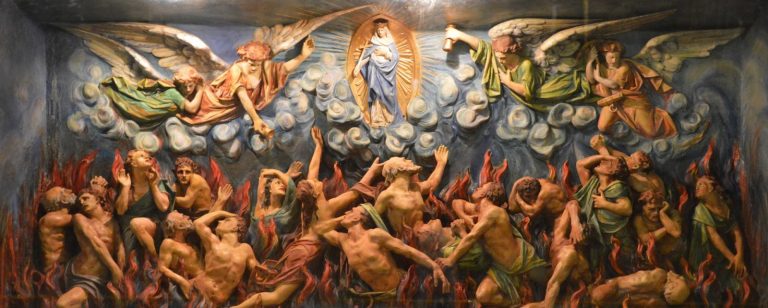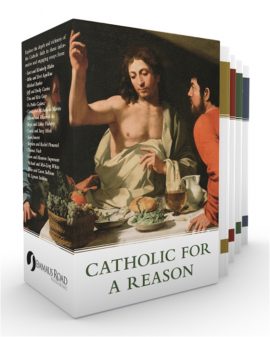By Curtis Martin
Curtis Martin is the founder and CEO of the Fellowship of Catholic University Students (FOCUS). He is a renowned speaker and author of numerous books. He also contributed to the Catholic for a Reason series, which features some of today's leading Catholic scholars.

Of all the misunderstood Catholic teachings—and there are a few of them—purgatory is often seen as the most embarrassing. Thousands of Catholics leave the Church every year. Their faith is questioned and their religious education doesn’t rise to the challenge. You’ve probably heard these questions yourself: “Where in the Bible does it say you have to go to a priest to confession?” “Where does it say that the pope is infallible?” “That Mary was conceived without original sin?” And, “Where in the world did you Catholics get the teaching on purgatory?” These are tough questions. But as good as they are, they don’t compare to the great answers that Scripture and apostolic Tradition have to offer.
When I began to investigate the teaching of purgatory, I did so as a fallen-away Catholic and an Evangelical Protestant. I used the tools my Evangelical friends had given to me: sacred Scripture, prayer, and Christ-centered friendships. I knew that it wasn’t enough to simply stop with the question, “Where in the Bible is purgatory?” As a Christian, the two most fundamental truths that I held were the Trinity—three Persons in one God: Father, Son, and Holy Spirit—and the Incarnation, that the eternal Son, at a point in history, took on human nature and became man like us in all things but sin. And yet the word “Trinity” and the word “Incarnation” were nowhere in Scripture. That is to say, the words weren’t, but the teachings were.
As I read through the New Testament, I came across a passage in St. Paul’s First Letter to the Corinthians that I found very surprising. While addressing the very issue of sin within the Christian community—those who were believers and had accepted the Lordship of Jesus Christ into their lives—Saint Paul says,
For no other foundation can any one lay than that which is laid, which is Jesus Christ. Now if any one builds on the foundation with gold, silver, precious stones, wood, hay, stubble–each man’s work will become manifest; for the Day will disclose it, because it will be revealed with fire, and the fire will test what sort of work each one has done. If the work which any man has built on the foundation survives, he will receive a reward. If any man’s work is burned up, he will suffer loss, though he himself will be saved, but only as through fire. (1 Cor 3:11–15)
The passage is quite clear: Gold and silver, when placed into a furnace, would be purified; wood and hay would be burned away. As this is done, the Scripture says we will suffer loss, but be saved “as through fire.” The image of purgatory was becoming more vivid as I read. What else could St. Paul be referring to? He can’t be referring to hell, because it’s clear that the people who undergo this “purifying fire” will be saved, while those who are in hell are lost forever. And yet he can’t be referring to heaven, because he mentions the suffering of loss, while in heaven every tear will be wiped away (Rev 21:4).
Scripture teaches that God is a “consuming fire” (Heb 12:29). The point St. Paul seems to make is that, as God draws us to Himself after death, there is a process of purification in the fire of God’s holy presence. God Himself purifies us of those imperfect deeds: the wood, hay, and stubble. And those works that are performed in faithfulness and obedience to Christ by the power of the Holy Spirit, those of gold and silver, are purified. This purification is necessary because, as Scripture teaches of heaven—the new Jerusalem—and the temple within it, “Nothing unclean shall enter it” (Rev 21:27).
“Purgatory” comes from the Latin word purgatorium. In Scripture, we find references to an afterlife that is neither the hell of the damned nor heaven. In the Old Testament, the Hebrew word sheol is used to describe this condition; in the New Testament, the Greek term is hades. I had always thought that hades was hell, but Scripture teaches very clearly that hades is not hell; it is distinct from gehenna, or the lake of fire which is the hell of the damned. In fact, the Book of Revelation describes how, at the end of time, death and hades are thrown into hell (gehenna). This is the second death, the lake of fire. Scripture teaches that at the end of time, there is no more death; once the purification of all souls has taken place, there is no more need for hades. These two realities, death and hades, are destroyed in hell, while the damned will remain there forever (Rev 20:14–15). This same concept of sheol (in Hebrew), hades (in Greek), and purgatorium (in Latin) is purgatory as we have come to know it today (Catechism 1030–32).
The hidden mystery behind the teaching of purgatory is our calling to live in God for all eternity, which requires us to give perfectly of ourselves (Matt 5:48). Even with deep faith, the Christian life is difficult. We are called to manifest heroic generosity, and yet generosity hurts in this life. No matter what we’re asked to give, we seem to run out—of time, of energy, of money. God calls us to acknowledge this weakness, this poverty, and to turn to Him and cry out for help that He might fill us with His grace.
In heaven, generosity will not hurt; the lack of generosity will hurt. That is because in heaven God will give Himself to us fully and completely, holding nothing back. Our ability to receive from Him will be completely contingent upon our ability, in turn, to immediately give back. Otherwise, the gift of God would destroy us. Like strapping a water balloon onto a fire hydrant nozzle, we would explode! It is only when we learn the habit of complete and total self-giving that we will be able to experience the joy of heaven.
This is the vocation of the Christian faithful: to accept the finished work of Jesus Christ, and to allow that work to be applied to our lives by the work of the Holy Spirit, so that those who are justified will be sanctified. For us it is impossible. But with God, all things are possible.
You Might Also Like
 The Catholic for a Reason series presents the biblical foundation of Church teaching through the wisdom and experience of today’s best apologists and scholars. Essential matters of faith—God’s plan of salvation, the Church, the Blessed Virgin Mary, the Mass, the Sacrament of Matrimony, and Catholic identity—are examined through the lens of Scripture to provide fresh insight and understanding for today’s Catholics.
The Catholic for a Reason series presents the biblical foundation of Church teaching through the wisdom and experience of today’s best apologists and scholars. Essential matters of faith—God’s plan of salvation, the Church, the Blessed Virgin Mary, the Mass, the Sacrament of Matrimony, and Catholic identity—are examined through the lens of Scripture to provide fresh insight and understanding for today’s Catholics.